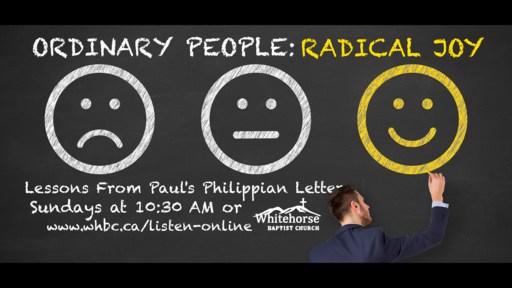The Choices That Lead To Radical Joy
Notes
Transcript
Whitehorse Baptist Church
"Ordinary People: Radical Joy"
"The Choices that Lead to Radical Joy."
STUDY QUESTIONS
1. Preparation
a. Why do Paul & Timothy call themselves “bond-servants”?
b. In the Ancient Near East, people’s identity came from the groups to which they
belonged; in the 21st century western world we define people as individuals.
What are the strengths and weaknesses of each approach?
2. Examination
a. The Day of the Lord in Isaiah 6 & 7 and Amos 8 & 9 has both threat of judgment
and promise of reward. When you read about the “day of Christ” in 2:16, do you
think it is a day of judgment or a day of reward?
b. How does what we think about the future influence our choices today?
3. Reflection
a. The Philippians in the church, like the city, were wealthy, powerful, ambitious
and concerned with honour. How would you describe Whitehorse’s culture? Do
you see that culture reflected in the church?
b. The church at Philippi is told to prefer one another, which goes against their
culture’s ethics. Jesus and Paul are offered as examples of individuals who
preferred others over themselves. What should “preferring one-another” look
like in the church?
4. Implementation
a. How do you reconcile being a “bond-servant” with being a “child of God”?
b. How do you respond to power & control issues in your family, work, social or
church life?
c. Saying, “focus on obeying God” is easy; doing it is hard. What strategies do you
use to help you focus on obeying God?

